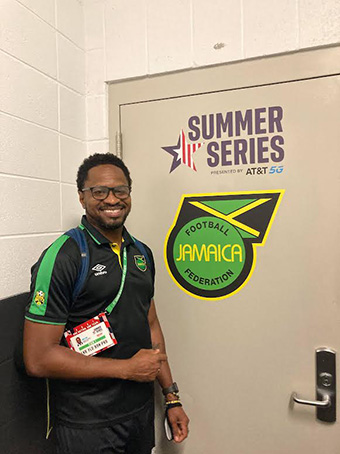Getting Yourself in the Game Is About More Than Physical Strength - It's Also a Mind Game
It’s no secret that athletes train their bodies rigorously to prepare themselves for
upcoming games big and small. They spend hours upon hours pumping iron, running drills,
and crushing their goals so they can claim victory when the day of the big game comes.
What’s not commonly addressed, however, is all the mental preparation that comes along
with training. In fact, many competitors in the Tokyo Summer Olympics are becoming
more outspoken about their mental health needs and how they often feel the weight
of the world resting upon their shoulders as the eyes of the world watch their every
move. No one knows this more than performance psychology consultant Nicholas Powell ‘03, a McKendree alum and adjunct professor of psychology.
Originally from Kingston, Jamaica, Nicholas received a scholarship to McKendree in
1999 and ran track. He earned a bachelor’s degree in physical education and, under the tutelage of Dr. Tami Eggleston, also earned a bachelor’s degree in
psychology after finding his calling. After earning a master’s degree in kinesiology from SIU-Edwardsville,
Nicholas founded his company, The Mind Game, in 2010, which helps athletes realize their potential through the use of mental
training and psychological tools. His clients have gone on to compete in the 2011
World Championships in Athletics in South Korea, the 2012 Olympics in London, the
2016 Olympics in Rio, and most recently, the 2020 Olympic Games in Tokyo.
While qualifying for and competing in the Olympics is no small feat, this year’s competitors
had an extra layer of difficulty to contend with – COVID-19. Because of the pandemic
still raging across the globe, no spectators are allowed in Tokyo’s Olympic Stadium.
“It’s really challenging because there are certain athletes who are driven by the
crowd, of having people in the stands and feeling the energy in the room. If you’re
the type of athlete who thrives in that environment, this situation can be very tough,”
Nicholas said. “We have seen athletes who were favored to be at the Olympics not get
the opportunity, and we have seen some athletes who were favored to win underperform
– not because of their physical abilities and talents, but because of the fear and
uncertainty competing in this pandemic has brought.” This uncertainty, along with a lack of contact, has greatly affected many athletes
as they compete. Even the most profound and powerful visualizations and imagery cannot
penetrate the frustration and anxiety that they feel, unless they’re equipped with
the psychological tools they need to help them through these trying times.
This uncertainty, along with a lack of contact, has greatly affected many athletes
as they compete. Even the most profound and powerful visualizations and imagery cannot
penetrate the frustration and anxiety that they feel, unless they’re equipped with
the psychological tools they need to help them through these trying times.
Even in a pandemic-free scenario, pressure and fear can still cause athletes to underperform.
“If you don’t have the proper tools and guidance, a lot of people can fall along the
wayside because of the internal pressures and stress to perform well,” he said.
![]()
“It’s also about focusing on your strengths. When we know what our strengths are, it enhances our confidence, which helps us approach anything we’re not confident about at the moment. My job as a performance psychologist is to help people ‘reverse engineer’ their goals and develop their strengths and confidence so they can find the courage they need to take on new challenges and overcome obstacles.”
And overcome obstacles they will. The American and Jamaican athletes whom Nicholas
has helped train are competing with thousands of participants hailing from 206 nations,
territories, and principalities. While these competitors will be fighting for the
gold without the physical presence of fans and their loved ones, Nicholas is looking
forward to seeing successful performances from his athletes.
Fortunately, mental health is becoming less and less stigmatized, especially as high-profile
athletes open up about their struggles on social media. Fans and spectators alike
become exposed to the stress and anxiety that training and performing have on athletes,
which helps increase awareness of the major role that mental health plays. Nicholas
hopes that more coaches and associations see the good that psychological training
has on athletes. “It’s not a Band-Aid fix right before competitions. I’m not giving
a pep talk; I’m providing athletes with tools, which they need to practice with over
time to perform and do their best,” he said. “It’s like a muscle – just like training
our physical muscles, we have to train the mind.”
![]() “It’s like a muscle – just like training our physical muscles, we have to train the
mind.”
“It’s like a muscle – just like training our physical muscles, we have to train the
mind.”
Nicholas emphasizes that performance psychology doesn’t just benefit athletes – it
can help anyone looking to take their performance to the next level, from CEOs and
managers to teammates working together in an office. “Performance psychology shouldn’t
be reactive, but rather proactive,” he said. “It’s like buying car insurance. We don’t
buy it whenever we’re involved in an accident. We have it to be covered in the event
that an accident occurs. In that sense, we’re providing tools to any individual who
wants to get the most out of any scenario while being equipped enough to minimize
the effects of anything that might go wrong.”
![]()
“It’s like buying car insurance. We don’t buy it whenever we’re involved in an accident. We have it to be covered in the event that an accident occurs. In that sense, we’re providing tools to any individual who wants to get the most out of any scenario while being equipped enough to minimize the effects of anything that might go wrong.”
